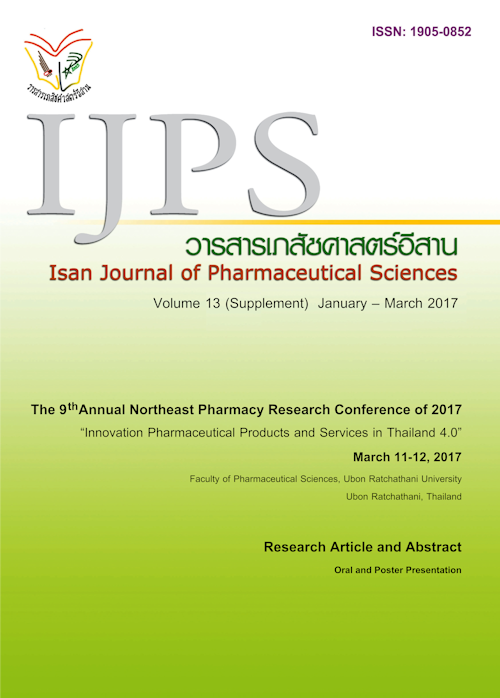Drugs used in patients with renal impairment at Sunpasittiprasong Hospital: A retrospective study
Main Article Content
Abstract
Introduction: Renal impairment alters drug pharmacokinetics, plasma drug levels, drug interactions, and adverse reactions, which are related to the accumulation of renally excreted drugs. Thus, appropriate dose adjustment is required in patients with reduced renal function to avoid any drug interactions and unwanted outcomes. The aim of this study was to assess whether appropriate dosage adjustment was made to the medications prescribed in hospitalized patients with renal impairment. Methods: A retrospective study was carried out on the Internal Medicine wards of Sunpasittiprasong Hospital. We included 18 year-old or older patients admitted to the hospital with eGFR < 60 ml/min/1.73m2 or experiencing acute kidney injury by AKIN criteria from January to December 2015. Also, each patient must have received at least one drug that requires renal dosage adjustment. Potentially inappropriate renal dosage adjustment was reported by using descriptive statistic, frequency and percentage. Results: Our study identified 674 of 2326 drugs (29.0%) from a total of 236 patients in whom dosage adjustment was required. 173 (25.7%) items were not renally adjusted, such as acyclovir gabapentin and tenofovir. 486 (72.1%) items were adjusted appropriately and 15 (2.2%) items were found to have potentially inappropriate dosage adjustment, including cefdinir 100%, cefazolin and imipenem each 20% when compared to their prescribing rate. Conclusion: Despite laboratory results indicating reduced kidney function, inappropriate renal dose adjustment still occurs. In order to enhance patient safety, especially in patients with renal impairment, this study suggests that promoting proper drug use and the development of electronic tools can assist the medical staff to provide the safest care to patients.
Article Details
In the case that some parts are used by others The author must Confirm that obtaining permission to use some of the original authors. And must attach evidence That the permission has been included
References
Aronoff GR, Berns JS, Brier ME, et al. Drug prescribing in renal failure Dosing guidelines for adults and children. 5th ed. Philadelphia, PA.: American College of Physicians. 2007.
Dager W, Halilovic J. Acute kidney injury. In: DiPiro JT, Talbert RL, Yee GC, et al. Pharmacotherapy a pathophysiologic approach, ninth editon. New York: McGraw-Hill, 2014: 611-632.
Doody HK, Peterson GM, Watson D, et al. Retrospective evaluation of potentially inappropriate prescribing in hospitalized patients with renal impairment. Curr Med Res Opin 2015; 31(3): 525-535.
Emami S, Esfahani H, Farokhi F, et al. Assessment of drug dose adjustment in patients with kidney disease: Opportunities for pharmacist involvement. Int J Pharm Sci 2012; 4(3): 178-181.
Getachew H, Tadesse Y, Shibeshi W. Drug dosage adjustment in hospitalized patients with renal impairment at Tikur Anbessa specialized hospital, Addis Ababa, Ethiopia. BMC Nephrol2015; 16(1). 158.
Ingsathit A, Thakkinstian A, Chaiprasert A, et al. Prevalence and risk factors of chronic kidney disease in the Thai adult population: Thai SEEK study. Nephrol Dial Transplant 2010; 25(5):1567-1575.
KDIGO CKD Work Group. KDIGO 2012 clinical practice guideline for acute kidney injury. Kidney Int Suppl 2012; 2: 1u138.
KDIGO CKD Work Group. KDIGO 2012 clinical practice guideline for the evaluation and management of chronic kidney disease. Kidney Int Suppl 2013; 3: 1-150.
Kim K, Onesti G, Ramirez O, et al. Creatinine clearance in renal disease. A reappraisal. BMJ 1969; 11-14.
Lacy CF, Armtrong LL, Goldman MP, et al. Drug Information Handbook with International Trade Names Index. 24th Ed. Ohio: Lexi-Comp. 2016.
Levey AS, Bosch JP, Breyer Lewis J, et al. A more accurate method to estimate glomerular filtration rate from serum creatinine: a new prediction equation. Modification of Diet in Renal Disease Study Group. Ann Intern Med. 1999; 130(6): 461-470.
Petri M, Bockenstedt L, Colman J, et al., Serial assessment of glomerular filtration rate in lupus nephropathy. Kidney Int 1988; 34(6): 832-839.
Prajapati A, Ganguly B. Appropriateness of drug dose and frequency in patients with renal dysfunction in a tertiary care hospital: A cross-sectional study. J Pharm Bioall Sci 2013; 5: 136-140.
Sah SK, Wanakamanee U, Lerkiatbundit S, et al. Drug dosage adjustment of patients with impaired renal function at hospital discharge in a teaching hospital. J Nepal Health Res Counc 2014; 12(26): 54-58.
Schwinghammer T, Koehler, J. Pharmacotherapy a pathophysiologic approach. 9 edition. McGraw-Hill Medical 2014.


